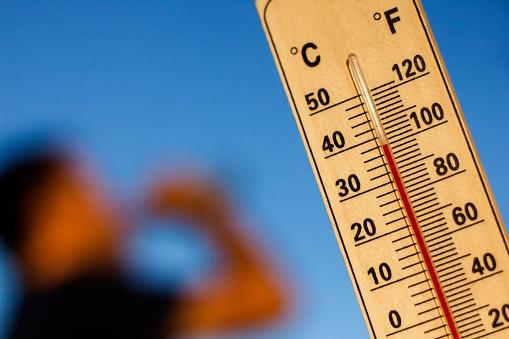Explore the World's Best Ideas
Join today and uncover 100+ curated journeys from 50+ topics. Unlock access to our mobile app with extensive features.
Rising temperatures and humidity are growing concerns
Research shows that the combination of temperature and humidity can get more dangerous faster than scientists previously believed.
Scientists and other observers have become alarmed about the increasing frequency of extreme heat paired with high humidity, measured as “wet-bulb temperature.” A 2010 study estimated the wet bulb temperature of 95 F at 100% humidity or 115 F at 50% humidity as the upper limit of safety. Recently this limit was tested on humans in a laboratory setting and showed that the wet-bulb temperature is actually 88 F at 100% humidity or 100 F at 60% humidity.
16
256 reads
What happens to the body when the body overheats
The combination of temperature and humidity whereby a person’s core temperature starts to rise is called the “critical environmental limit.”
- Below those limits, the body is able to maintain a fairly stable core temperature over time.
- Above those limits, core temperature rises continuously, and the risk of heat-related illnesses with prolonged exposures is increased.
- When the body overheats, the heart has to work harder to pump blood flow to the skin to disperse the heat. When you're also sweating, it decreases body fluids.
- In the worst case, prolonged exposure can cause heat stroke.
13
226 reads
Dry vs. humid environments
Global heat waves are approaching and exceeding the critical environmental limit.
In hot, dry environments, the critical environmental limits aren't defined by wet-bulb temperatures because almost all the sweat the body produces evaporates, which cools the body.
The cutoffs are based on keeping your body temperature from rising too much. Even lower temperatures and humidity can stress the heart and other body systems, and prolonged exposure may become extreme for the elderly and those with chronic diseases.
13
166 reads
Climate change is a problem for the future
In high heat, staying well hydrated and finding areas to cool down are important.
- But those with access to air conditioning might not use it because of the high energy cost or large-scale power outages during heat waves or wildfires.
- The future climate in Africa will not be conducive to the use of even low-cost cooling systems such as “swamp coolers” as the tropical and coastal parts of Africa become more humid.
The evidence continues to mount that climate change is a problem humanity must tackle head-on.
13
163 reads
IDEAS CURATED BY
Natalie Washington's ideas are part of this journey:
Learn more about scienceandnature with this collection
Importance of rest and recovery
Effective workout routines
Proper nutrition for muscle building
Related collections
Similar ideas
3 ideas
Why is humidity so uncomfortable?
livescience.com
2 ideas
Heat wave | meteorology
britannica.com
6 ideas
Read & Learn
20x Faster
without
deepstash
with
deepstash
with
deepstash
Personalized microlearning
—
100+ Learning Journeys
—
Access to 200,000+ ideas
—
Access to the mobile app
—
Unlimited idea saving
—
—
Unlimited history
—
—
Unlimited listening to ideas
—
—
Downloading & offline access
—
—
Supercharge your mind with one idea per day
Enter your email and spend 1 minute every day to learn something new.
I agree to receive email updates


